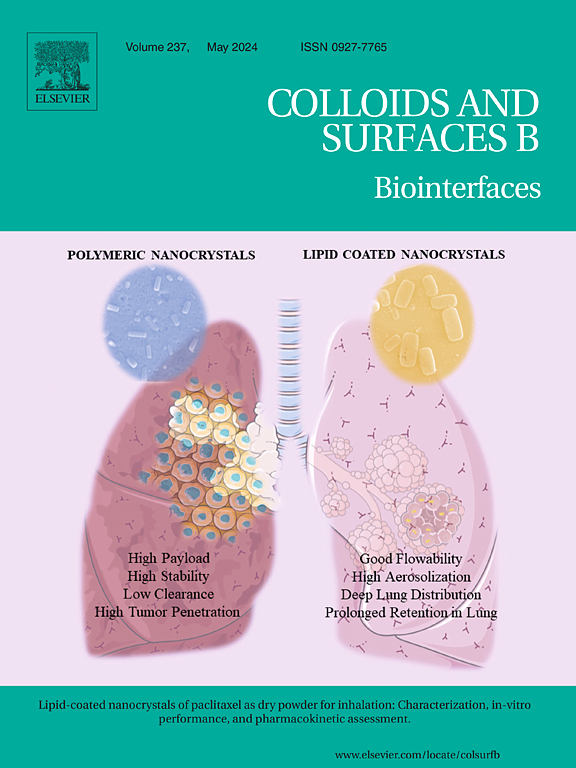Impact of pH-dependent dynamics of human serum proteins on dialysis membranes: Cryptographic structure assessment, synchrotron imaging of membrane-protein adsorption, and molecular docking studies
IF 5.4
2区 医学
Q1 BIOPHYSICS
引用次数: 0
Abstract
Proteins are fundamental to biochemical processes and critical in hemodialysis. This study investigates the impact of pH on human serum albumin (HSA), fibrinogen (FB), and transferrin (TRF) interactions with polyarylethersulfone (PAES) hemodialysis membranes. A multi-method approach was utilized, including protein crystallography for structural insights, hydration layer analysis to explore solvation and interaction potentials, molecular docking using AutoDock 4.0 for binding affinity simulations, and in-situ X-ray synchrotron SR-μCT imaging to observe protein deposition dynamics. Molecular docking revealed that PAES demonstrated superior binding energies and interaction patterns with FB and TRF compared to cellulose triacetate (CTA), facilitated by specific hydrogen bonding within a water shell. CTA displayed weaker, hydration-sensitive interactions varying with pH. Imaging studies indicated that FB showed higher adsorption at pH 6 than at pH 7.2, predominantly in the middle membrane regions. Similarly, HSA and TRF exhibited increased adsorption at pH 6, suggesting a stronger affinity under acidic conditions. Mixed protein solutions also indicated higher adsorption at pH 6, emphasizing an increased risk of membrane fouling. These findings highlight the crucial role of pH in modulating protein-membrane interactions and enhancing the efficacy of hemodialysis. A deeper understanding of hydration environments and their effects on protein binding affinities provides valuable insights for optimizing membrane design and performance. Clinically, this research suggests that fine-tuning pH during hemodialysis could mitigate protein fouling on membranes, thereby improving procedural efficiency and potentially leading to better patient outcomes through enhanced dialysis effectiveness.
人血清蛋白的 pH 值动态对透析膜的影响:密码学结构评估、膜蛋白吸附同步辐射成像和分子对接研究。
蛋白质是生化过程的基础,也是血液透析的关键。本研究探讨了 pH 值对人血清白蛋白(HSA)、纤维蛋白原(FB)和转铁蛋白(TRF)与聚芳基醚砜(PAES)血液透析膜相互作用的影响。研究采用了多种方法,包括通过蛋白质晶体学深入了解结构、通过水合层分析探索溶解和相互作用潜力、通过 AutoDock 4.0 进行分子对接模拟结合亲和力,以及通过原位 X 射线同步加速器 SR-μCT 成像观察蛋白质沉积动态。分子对接显示,与三醋酸纤维素(CTA)相比,PAES 与 FB 和 TRF 的结合能和相互作用模式更优越,这得益于水壳内的特异性氢键。CTA 显示出较弱的、对水合作用敏感的相互作用,并随 pH 值的变化而变化。成像研究表明,FB 在 pH 值为 6 时的吸附力高于 pH 值为 7.2 时的吸附力,主要吸附在膜的中间区域。同样,HSA 和 TRF 在 pH 值为 6 时也显示出更高的吸附性,这表明它们在酸性条件下具有更强的亲和力。混合蛋白溶液在 pH 值为 6 时也显示出较高的吸附性,强调了膜堵塞风险的增加。这些发现凸显了 pH 值在调节蛋白质-膜相互作用和提高血液透析疗效方面的关键作用。深入了解水合环境及其对蛋白质结合亲和力的影响,可为优化膜设计和性能提供宝贵的见解。在临床上,这项研究表明,在血液透析过程中微调pH值可以减轻蛋白质在膜上的堵塞,从而提高程序效率,并有可能通过提高透析效果来改善患者的预后。
本文章由计算机程序翻译,如有差异,请以英文原文为准。
求助全文
约1分钟内获得全文
求助全文
来源期刊

Colloids and Surfaces B: Biointerfaces
生物-材料科学:生物材料
CiteScore
11.10
自引率
3.40%
发文量
730
审稿时长
42 days
期刊介绍:
Colloids and Surfaces B: Biointerfaces is an international journal devoted to fundamental and applied research on colloid and interfacial phenomena in relation to systems of biological origin, having particular relevance to the medical, pharmaceutical, biotechnological, food and cosmetic fields.
Submissions that: (1) deal solely with biological phenomena and do not describe the physico-chemical or colloid-chemical background and/or mechanism of the phenomena, and (2) deal solely with colloid/interfacial phenomena and do not have appropriate biological content or relevance, are outside the scope of the journal and will not be considered for publication.
The journal publishes regular research papers, reviews, short communications and invited perspective articles, called BioInterface Perspectives. The BioInterface Perspective provide researchers the opportunity to review their own work, as well as provide insight into the work of others that inspired and influenced the author. Regular articles should have a maximum total length of 6,000 words. In addition, a (combined) maximum of 8 normal-sized figures and/or tables is allowed (so for instance 3 tables and 5 figures). For multiple-panel figures each set of two panels equates to one figure. Short communications should not exceed half of the above. It is required to give on the article cover page a short statistical summary of the article listing the total number of words and tables/figures.
 求助内容:
求助内容: 应助结果提醒方式:
应助结果提醒方式:


